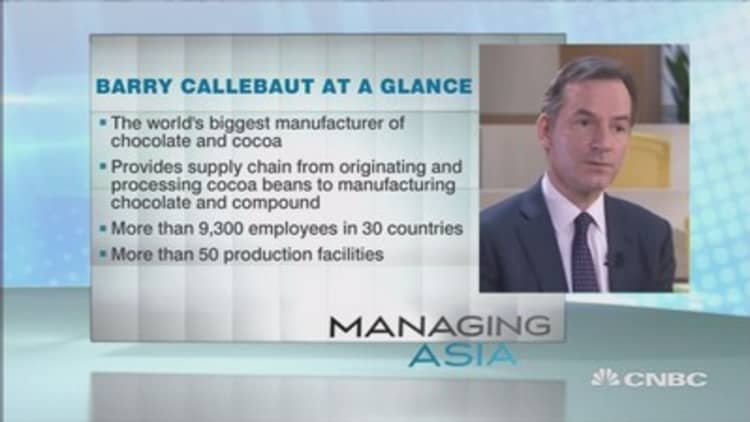
Barry Callebaut, the world's largest cocoa processor, expects Asia's insatiable demand for chocolate to make up one-quarter of its global sales over the next two decades.
Currently, Europeans are the company's biggest customers, accounting for more than 50 percent of global sales. Sales in Asia, meanwhile, make up less than 20 percent.
"If you look at charts of chocolate growth compared to cars and other consumer products, the curve of chocolate growth in Asia is much more sustainable over time," Andreas Jacobs, chairman of Barry Callebaut, told CNBC's "Managing Asia."
According to data from Euromonitor, Asia's chocolate consumption averaged 200 grams per person last year. While that figure trails behind its global counterparts such as the Middle East, demand for the candy expanded at 4.5 percent, marking the fastest rate globally.
Within the region, the Zurich-based company, which sells chocolate, cocoa liquor, nuts and other products to chocolatiers and bakers, is betting on China and India to take the lead in growth.
"We're expecting chocolate consumption in big countries like India and China to see double digit growth. If China grows more than 10 percent and India above 20 percent, extrapolate that to the next 20 years, I guess we end up with Asia [accounting for] around 25 percent of our global sales," Jacobs told CNBC.
Read MoreA chocolate shortagelooms
Beyond the region's top two most populous countries, Barry Callebaut has also set its sights on Southeast Asia.
"There is a big correlation between chocolate consumption and gross domestic product (GDP) per capita growth. Singapore is already a big consumer in terms of per capita, while Indonesia and Malaysia are growing. I think Southeast Asia has a great affinity to this product," said Jacobs, who also holds the position of executive chairman at Jacobs Holding. Jacobs Holding is a Swiss investment fund, which holds a majority stake in Barry Callebaut.
To ensure that the company is positioned to capture a bigger slice of the market, acquisition is a key ingredient in Barry Callebaut's recipe for success in Asia.
In 2013, the world's largest maker of bulk chocolate acquired the cocoa ingredients division of Singapore-listed Petra Foods for $950 million. According to Jacobs, the move is a "big footstep" in the Zurich-based company's history.
"Our sales in Asia were below 10 percent so we had to do something. [Apart from that,] it opened the doors to sourcing beans from Asia, instead of [focusing on] Africa and Brazil only. So now we have a good footprint in all the cocoa-growing countries," the 52-year-old said.
Cocoa price correction?
Driven by robust demand, the cocoa market has been one of the few bright spots in the agricultural commodity space over the past year. Since hitting a three-and-half-year peak of $3,371 a ton last September on the back of concerns that the deadly Ebola outbreak in West Africa could spread to cocoa-growing regions, prices have fallen around 7 percent.
But Jacobs says prices remain overvalued by 10-20 percent and believes a correction is long overdue. Cocoa futures traded at $3,122 a ton in New York on Thursday.
"It's not just fungus or issues like Ebola in the African growing countries. Financial markets are pushing the prices of these natural ingredients, which I don't think is the right course because it doesn't reflect the economics," he said.
Read MoreHot chocolate! Behind the big cocoa rally
Barry Callebaut is weathering the hike in raw material costs by passing them to the customers, but if cocoa prices continue their march upward, the company may take a hit amid a competitive market.
"If [prices] move higher, we will see an impact as we have seen in 2014 when higher chocolate prices led to a big hit in consumption... For the first time in 15 years, we saw negative growth globally for chocolate last year," Jacobs told CNBC.
Shares of Barry Callebaut slipped 0.47 percent in Zurich on Thursday to settle at 1,068 swiss . Andreas Jacobs' father Klaus Jacobs is a German-born entrepreneur who established the company in 1996.
— Reporting by Christine Tan | Written by See Kit Tang



